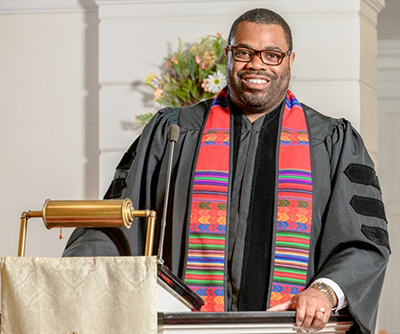Tips for Busy Pastors
If you were to ask any preacher that is expected to preach at least 48 out the 52 Sundays per year to the same congregation from the same pulpit, most of them will openly confess that preaching is hard work.
After 15 years of preaching (10 years, full-time), I have discovered that as endearing as the congregation is, they will never understand the hard work that a preacher puts in week after week to deliver a 20-minute sermon every Sunday.

The late Rev. Gardner C. Taylor, considered “the dean of the American preaching,” labeled this weekly task as “...the sweet torture of Sunday morning.” The late Rev. James Earl Massey, known in the Metropolitan Church of God in Detroit, as the “Prince of Preachers,” labeled this weekly task as “...the burdensome joy of Sunday morning...” Whatever you want to call it, if the weekly preacher is not careful, amid other demands of pastoral ministry, sermon preparation and preaching can become a daunting affair.
Although sermon preparation and preaching are challenging tasks, here are six practical tips that will aid the busy preacher to prepare to preach for the long haul:
- Prepare the “Preaching Menu”
When I was in high school, the kitchen staff in the school cafeteria would plan the lunch menu one month ahead of time and publicize it. This gave the kitchen staff a roadmap to follow, and made it much easier for them to plan meals for the more than 400 students. The students enjoyed the lunch menu being published a month ahead of time as well. Maybe, because it gave us something to look forward to. Nevertheless, like the kitchen staff in my high school, it is imperative for the busy preacher to always prepare a “preaching menu.” This “menu” can be prepared quarterly, bi-annually, or annually. I prefer to plan quarterly. Once per quarter, I clear my schedule, sit alone at my kitchen table with my laptop, my Bible, the church calendar, the national calendar, and a collection of commentaries, to plan my preaching calendar. (Side Note: I do this whether I am following the lectionary or not.)
Next, I type at the top of the blank Word document, “Preaching Menu,” my name, and the church name. I then type in all the dates that I will be preaching and include dates for the special events from the church and national calendars. Afterwards, I begin to plan.- Am I going to preach through the lectionary this quarter? Or, through a particular section of the Bible?
- Am I going to preach a series of sermons through the parables or through a section of the Psalms?
- Read Diverse Materials
It is imperative for the busy pastor to carve out time to read, widely. It is so easy for preachers to read books on ministry, theology, and homiletics, so it would benefit the busy preacher to strive to expand their horizons outside of the field of ministry. Keep in mind: most of the people who listen to the busy preacher did not attend seminary. They are schoolteachers, janitors, business owners, politicians, the unemployed, chemists, retirees, film enthusiasts, avid readers, single parents, divorcees, empty nesters, documented and undocumented, etc. With that in mind, it is imperative for the busy preacher to read diverse materials so that they can relate to their audience on numerous levels. Reading will not only expand the preacher’s horizons, but it will also keep their minds fresh and enhance their creativity. - Engage in Pastoral Care
We’ve all heard the phrase coined by President Theodore Roosevelt that, “People don’t care how much you know until they know how much you care.” Before writing this article, I took a poll (among settled ministers) on social media and asked, “What is the secret for preaching for the long haul?” One of the responses that stuck out to me was “pastoral care.” Pastoral care and preaching go hand-in-hand. For the settled minister, they are like a set of Siamese twins. They cannot be separated. If they are separated, they run the risk of major complications that can lead to their demise. It is paramount for the busy preacher to engage in pastoral care consistently. Engaging in pastoral care gives the preacher a front-row seat into the lives of the parishioners they serve, which can aide the busy preacher in planning their menu of sermons. - Get Involved in Nonchurch Activities
It is well-known that sometimes ministers can become so busy that they begin to isolate themselves. It is also well-known that ministers can be so entangled in church-related and denominational-related activities (e.g., boards, committees, planning meetings, etc.), that they lose touch with what is going on in their own local communities. During my 6th year of preaching full-time, I found out that it was crucial for me to get involved in nonchurch-related activities in my local community. One example is my recent involvement in affordable housing in the City of Rochester. This one activity has drastically changed my political views, my sociological views, and my homiletical approaches. I strongly encourage the busy preacher to get involved in at least one non-ministry related activity. - Believe in What Your Preach
You will be amazed at how many ordained clergypersons stand behind the sacred desk, Sunday after Sunday, and they don’t believe what they are preaching. Don’t get me wrong, we all have various hermeneutical approaches to Scripture. I lean more towards a liberal/progressive hermeneutic myself. The late Marcus Borg is one of my favorite progressive theologians, and his philosophy of Scripture is, “Taking the Bible seriously; but not literally.” So, I am not talking about hermeneutical approaches. I am talking about believing in the power that dwells in the divine source of which they speak about. It is crucial for the busy pastor to believe in what they are preaching, so that the people to whom they are preaching will also believe. - Step Back from the Pulpit
Finally, three years ago I went to my Council and told them that four Sundays off per year wasn’t enough. I specifically said, “Preaching is my passion, but I need more time out of the pulpit. This is a lot of work.” Not all of them understood. Some of them felt it was my job to preach, so I needed to be there 48 out of the 52 Sundays to preach. But by the grace of God, they allowed me to take more time out of the pulpit. Now, I only have to preach about 42 out of the 52 Sundays per year. In addition to the above tips on preaching for the long haul, it is crucial for the busy pastor to step back from the pulpit, periodically. If the busy pastor is going to remain fresh and relevant, they need time out of the pulpit to breathe, to listen to other pastors preach, to visit other churches, and to reflect on what they have been preaching, themselves.

Rev. Dr. Michael L. Sloan is the Senior Minister of First Congregational Church of Spencerport. He is passionate about preaching, pastoral care, church leadership, writing, community development, affordable housing, and small business ownership. Rev. Sloan earned a Bachelor of Business Administration; a Master of Divinity in Homiletics; a Master of Arts in Theology; and a Doctor of Ministry in Homiletics. He completed his Clinical Pastoral Education through Crossroads of Caring, Inc. Rev. Sloan is a New York Conference Board Member, the President of Spencerport Ecumenical Ministries (SEM), a participant in the Next Generation Leadership Initiative (Cohort ’13), and is a participant in the UCC’s Minister’s Financial Vitality Initiative. Rev. Sloan is married to the lovely Ebony Sloan, an elementary school teacher. They have a 23-year-old daughter, Michelle, who earned an A.A.S. in Fashion Business.
